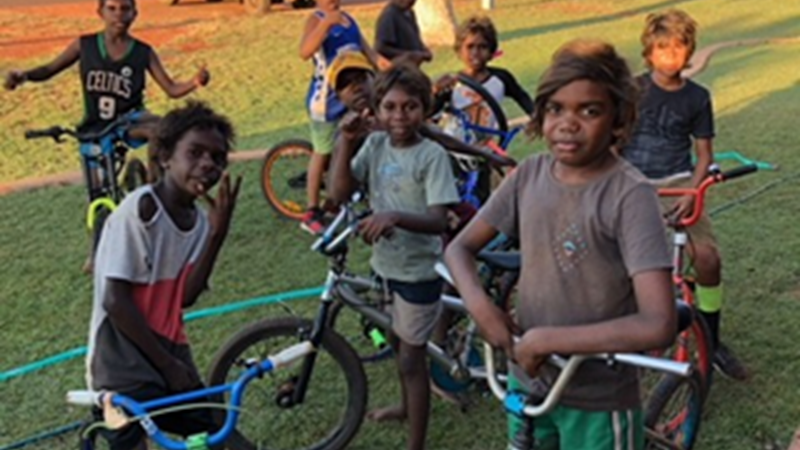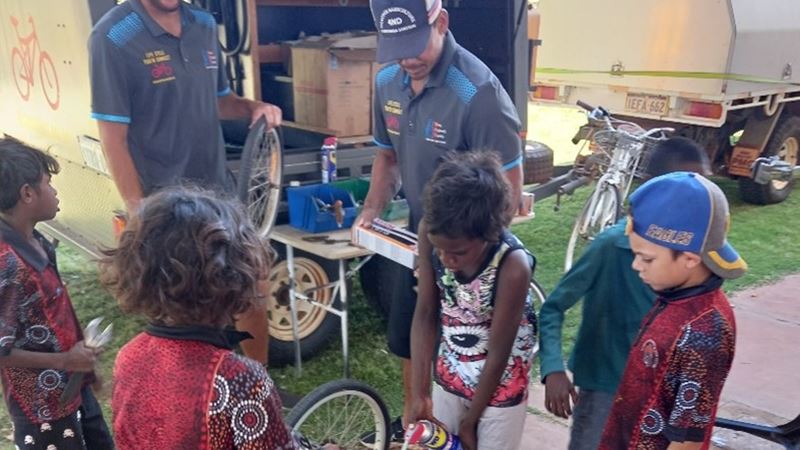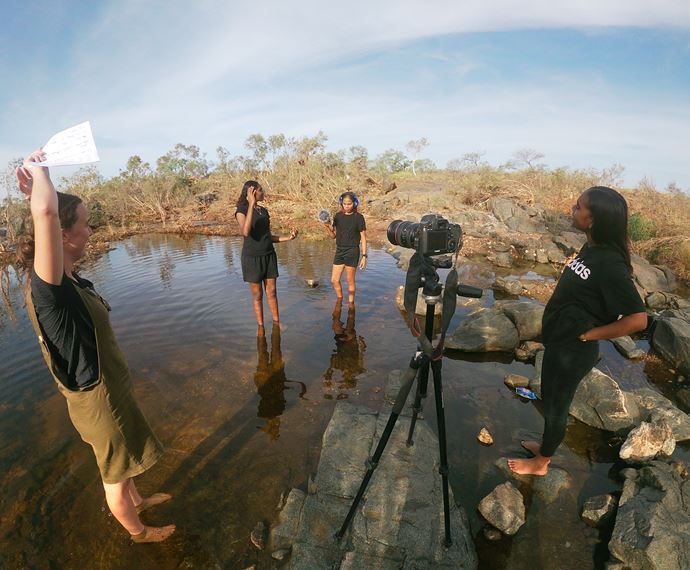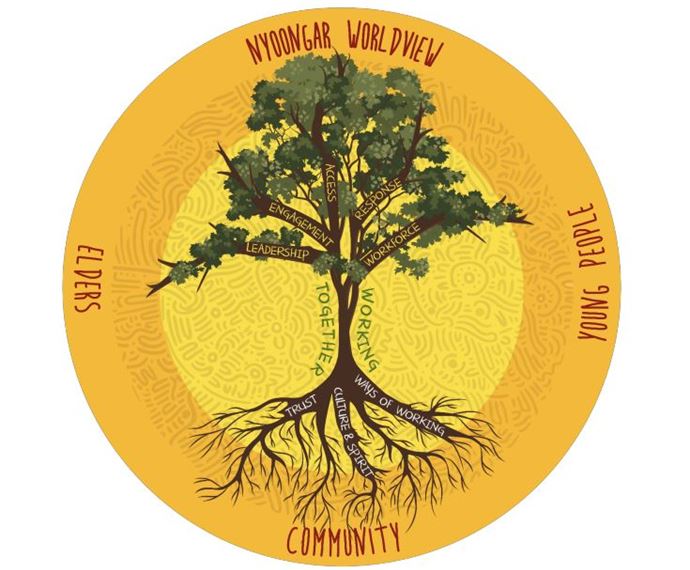Supporting health and wellbeing outcomes in the West Kimberley
Based in Broome, the Men’s Outreach Service Aboriginal Corporation (MOSAC) provides services that foster resilience while promoting the wellbeing of men, their families, and their communities in the West Kimberley and as far as Kununurra (as capacity allows).
MOSAC works with men, women and children impacted by complex, and often multiple and interrelated issues including homelessness, alcohol and drug use, isolation, loss, grief, intergenerational trauma, suicide, and family violence.
Lotterywest support helped MOSAC expand a unique pilot program offering bicycle repair sessions to raise awareness of support services available, and support health and wellbeing outcomes for Aboriginal men and their families in the West Kimberley.
Towards a vehicle, resources and project costs to improve the wellbeing and health outcomes of Aboriginal men and boys in the West Kimberley.
Mens Outreach Service Aboriginal Corporation
9/24/2019
$1,709,362
Lotterywest
$932,338
Kimberley
Aboriginal and Torres Strait Islander people, Families
- The Life Cycle project successfully delivered safe and healthy activities to marginalised and at-risk youth, especially in remote communities.
- The project grew collaborations and partnerships with locally based community groups and organisations.
- Development of resources for the program and organisation including information pamphlets and bike donations.
- Laid the foundation for the establishment of the Together We Ride program.
- Bringing together diverse groups of stakeholders through the bicycle repair activities created safe and welcoming environments for young people to engage.
- Working closely with other youth service providers meant Life Cycle benefitted from established community relationships and most effectively used its resources.
- Development of partnerships laid groundwork for future collaborations.
- Beginning in early 2020, restrictions for organisations and people to enter communities significantly impacted operations.
- COVID-19 caused delays in freighting of equipment and other resources.
- No additional funding has been secured for the ongoing delivery of this valuable program. MOSAC continues to seek funding to continue this program.

Opportunity
Across Australia, there continues to be over-representation of Aboriginal children and young people, particularly boys, in contact with the justice system. In the West Kimberley region, there are high levels of crime, frequent antisocial behaviour, and a lack of appropriate positive support services for young people.
In 2018, the Men’s Outreach Service Aboriginal Corporation (MOSAC) delivered a 12-month pilot partnership with WA Police using a mobile bicycle repair workshop model to increase positive engagement with, and awareness of, service providers. This pilot partnership operated across seven communities for 530 young Aboriginal people.
Evaluation of the pilot demonstrated impact in skills development, stronger relationships with service providers, an increase in young people’s self-esteem and increased awareness of supports and resources available in the region. The evaluation also made several recommendations to expand impact through an extended schedule of activities to reach up to 4,500 Aboriginal people across the region.
From this pilot partnership, the MOSAC team developed Life Cycle Youth Connect (Life Cycle). This project expanded the operation of mobile bicycle repair sessions across the West Kimberley as a diversionary activity for Aboriginal children and young people.
Approach
During the two-year expanded pilot supported by Lotterywest, Life Cycle aimed to bring together a range of services and communities to provide a safe and culturally appropriate space to address a gap in wrap around supports and engage young people in positive education activities. The project worked to strengthen positive relationships between young people, the police, and support services, and address a range of complex and inter-related issues including intergenerational trauma.
The aims of Life Cycle were:
- To provide an effective engagement and diversionary program for offending and disengaged Aboriginal young people.
- To address the high rate of crime and antisocial behaviour by young people in Broome, Derby, and surrounding communities.
- To create a space to bring together a diverse range of service providers and youth justice workers to engage ‘at risk’ children and young people, addressing a gap in wrap-around services for youth.
- To address a lack of after school and holiday activities for youth, particularly in communities.
- To build capacity within communities, to take ownership of the program and build a case for a locally based employment opportunity.
- To be integrated with existing youth programs such as ALIVE and Kicking Goals!, and also into a regional youth justice strategy that was anticipated at the time.
“Christopher loves his bike. He is that jealous for it, won’t let anyone touch it or ride it. At night he brings it inside the house, so nobody steals it. He is that happy for this bike. It has also helped with his behaviors as well because he uses up all his energy riding around town, so we are seeing less bad behaviors at home. Thanks to the men's outreach service for their support.”
Parent , Fitzroy Crossing
Impacts and outcomes
Life Cycle activities and events were completed in the towns of Broome and Fitzroy Crossing, and numerous remote communities in the West Kimberley, including Bidyadanga, Looma and the Dampier Peninsula.
The Life Cycle project successfully delivered safe and healthy activities to marginalised and at-risk youth, especially in remote communities. During delivery, the project:
- Grew collaborations and partnerships with locally based community groups and organisations, including:
- Yiriman Project.
- Kimberley Aboriginal Law and Cultural Centre.
- ALIVE & Kicking Goals! Youth Suicide Prevention Program.
- Community Police in Bidyadanga, Dampier Peninsula, Fitzroy Crossing and Looma Community.
- Schools and principals at La-Grange Mission, Sacred Heart in Beagle Bay, Djardinjin/Lombadina, Ardyaloon (OAP), Fitzroy Crossing High School, Looma and Mt. Barnett.
- Broome Youth & Family Hub.
- Developed resources for the program and organisation, including:
- Information pamphlets.
- Bike donations from the people of the community.
- Development of the LCYC logo by a young member of the team.
- Received overwhelming positive feedback and demand to provide more events in community.
“I was really happy to see these two organisations come together and make this happen, we should have more interactions and more getting together in our communities with these two organisations”
Female Karajarri Elder from Bidyadanga on the Yiriman camp at Light House -Bidyadanga.
The program laid the foundation for MOSAC to establish the Together We Ride program. Together We Ride is targeted at engaging a higher risk group, boys in Broome and the West Kimberley aged 12–14, who have been identified as being at risk of becoming involved in more serious offending.
Following from Life Cycle, and applying experience and networks gained during its delivery, MOSAC has:
- Secured funding for Together We Ride and employed a project coordinator and a young team of strong Aboriginal male mentors.
- Built a closer partnership with ALIVE & Kicking Goals! program with peer educator mentors for the Together We Ride program.
- Become a member of the Broome Regional Youth and Families Council (hosted by West Kimberley Empowered Communities) to enhance collaboration with other youth programs and stakeholders.
- Identified the opportunity to be further involved in the development of the Kimberley Juvenile Justice Strategy, through the Broome Regional Youth and Families Council.
- Continued use of the Life Cycle trailer in partnership with ALIVE & Kicking Goals! and Together We Ride to deliver bike repair sessions and engagement to communities.
“This program provided a safe space where young people and their families could engage. The tool was bike maintenance, the aim was conversations around Social & Emotional Wellbeing Awareness.”
Dion Parriman, Life Cycle staff member

What worked
Community support increased engagement
Through consultation and relationship building, the program was supported by community, local police, and educators. Bringing together diverse groups of stakeholders through the bicycle repair activities created safe and welcoming environments for young people to engage.
Collaboration with other youth programs
Working closely with other youth service providers working in the region meant Life Cycle was able to benefit from community relationships those organisations had, and most effectively use its resources. The development of these partnerships has also laid the groundwork for future collaborations where there is an alignment of project objectives.
Key challenges
Contingency planning for COVID-19 impacts
Beginning in early 2020, restrictions for organisations and people to enter communities significantly impacted operations.
COVID-19 also caused delays in freighting of equipment and other resources. While Life Cycle staff did the best to utilise the resources they had, there were times when kids missed out on fixing their bikes due to insufficient equipment.
Building in contingency time for these restrictions and delays was not foreseen at the time of application in 2019 but is something to be considered for future projects.
There has been no additional funding secured for the ongoing delivery of this valuable program. MOSAC continues to seek funding to continue this program.
Learn about wellbeing
Understand how your community is going to help you to better target and plan your project.
Ready to plan your project?
Understand your vision, plan your impact and report on the outcomes of your project with three easy interactive tools in the Community Impact Planner.
Acknowledgement of Country
The Western Australian Community Impact Hub acknowledges and pays respect to the Traditional Owners of the land on which we are based, the Whadjuk people of the Noongar Nation and extends that respect to all the Traditional Owners and Elders of this country. We recognise the significant importance of their cultural heritage, values and beliefs and how these contribute to the positive health and wellbeing of the whole community.


![Picture1[1]](/media/mavdfuwn/picture1-1.jpg?anchor=center&mode=crop&width=690&height=570&rnd=133051352252900000&quality=80)